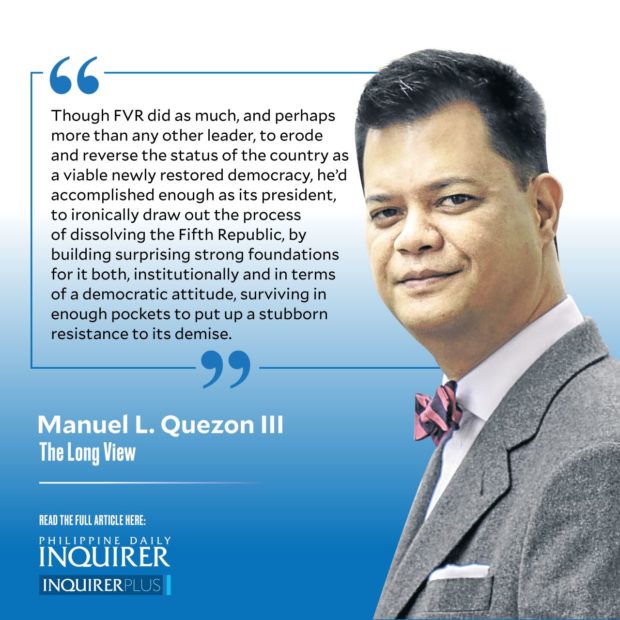
The story is probably exaggerated, but like many such tales, it likely contains a kernel of truth. The military, for all the opportunities and training it provided, was all too often at the beck and call, and subject to the whims, of civilian politicians. For outsiders turned insiders like Ferdinand Marcos and Juan Ponce Enrile, what made the prospects of a New Society seductive for the military wasn’t just power, prestige, and its accompanying perks, but the satisfaction of giving the Old Society its comeuppance.
In the end, Enrile and Ramos discovered that in Marcos’ New Republic, they could only rise so high; the absolute highest would, however, be reserved only for the Marcoses and, in Ramos’ case, he would never rise higher than Fabian Ver. Near the very end (of his regime, on Feb. 16, 1986) Marcos announced Ver’s retirement, only to swiftly announce it would be indefinitely postponed. Cory Aquino was reported to have asked, “When will he [Ramos] decide what he is for?”
In contrast to Enrile and his thwarted putsch, Ramos retained an aura of frustrated professionalism, which enough of his fellow soldiers found evocative to lead to their withdrawing support, even as Ferdinand Marcos publicly playacted tolerance while privately ordering a bloodbath at Edsa. In the words of the scholar, Anne Mackenzie, Ramos joined the revolt “for reasons of his own”: It was clear enough why Enrile engaged in open rebellion against Marcos: He’d been found out. Ramos, however, wasn’t implicated in the aborted RAM putsch; and precisely because he had no self-interested motive, it’s likely Ramos was more instrumental in Edsa, turning out the way it did. As Mackenzie put it, “the high regard in which he was held, even by pro-Marcos forces, and the solid power-base he enjoyed within the AFP and at the US embassy could well have guaranteed the survival of the mutiny beyond its first few hours.”
This, then, was what he was for, and for which he received absolution for his participation in the planning and enforcement of the dictatorship: the idea of an armed forces that was more than merely the private army of one family, and of the supremacy not of the military but of that startlingly vague but powerful notion of the (civilian) people. By the time he made this stand, his father had died; in the end, he would have seen his son had absorbed more than he’d expected.
It took an old soldier to be a peacemaker, conferring, in a sense, the absolution he’d received from the nation when they hailed him at Edsa, to the military’s blood enemies, the Communists and the Moro rebels, both of whom obtained under law the kind of amnesty he also extended to the military rebels whose messianism proved every bit as bloody and destructive as the Communists they’d tortured in detention and fought in the mountains. Indeed it was Ramos, the bemedaled Cold War Warrior, who gave up the republic’s strongest legal weapon against the Left: repealing the Anti-Subversion Act of 1957.
He was a consensus-builder, he was a manager, and by the measure he asked to be judged—as the bringer of economic stability and prosperity to bookend the restoration of democracy achieved by his predecessor—he was successful though not appreciated as much for it because of the Asian Financial Crisis. If the mark of a successful leader is that his policies, in turn, become adopted by other leaders who have no affinity for him, then Ramos was successful in an administration he was never close to nor helped: In many meetings with his Cabinet, Benigno S. Aquino III often referred to Ramos’ policies on business and the economy as worthy of emulation.
To this catalog of virtues and achievements must be added his three dubious legacies to the nation. The first of these was that Ramos destroyed the party system by bolting his party when he lost to Ramon Mitra Jr. in the LDP party convention. The outcome answered, in the negative, whether a ruling party could ever find the wherewithal to resolve leadership questions within its own ranks, leading to the perpetuation of a movement and not just personalities. Political parties ever after would be feast-and-famine temporary coalitions: a rag-tag assembly of early believers which, upon victory, would bloat to colossal size, only to deflate the moment talk of succession began. At the end of his term, Ramos would reap what he had sown.
A year or two earlier, he’d correctly identified the shortcomings of our Fifth Republic, but his proposals to address its flaws not only failed to convince, but invited a crippling collision with public opinion and the gatekeepers of our newly restored democracy (the media, the Catholic Church, and civil society), in a rally presided over by Cory Aquino and Cardinal Sin. His Charter change effort limped along until it was run over legally after the Supreme Court gutted people’s initiative as a viable alternative to Congress’ unviable, because procedurally impossible, inability to propose amendments. He would repeatedly return to his proposals which he’d revive after each political intervention calculated to maintain political relevance but which, ironically, ensured the dissipation of his influence: His decision to support Gloria Macapagal Arroyo in her moment of maximum danger in 2005, and his throwing his support behind Rodrigo Duterte in 2016.
Though he did as much, and perhaps more than any other leader, to erode and reverse the status of the country as a viable newly restored democracy, he’d accomplished enough as its president, to ironically draw out the process of dissolving the Fifth Republic, by building surprisingly strong foundations for it both, institutionally and in terms of a democratic attitude, surviving in enough pockets to put up a stubborn resistance to its demise.
Email: mlquezon3@gmail.com; Twitter: @mlq3

